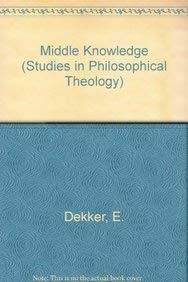Verwandte Artikel zu Middle Knowledge: 20 (Studies in Philosophical Theology)

Inhaltsangabe
The theory of "Middle Knowledge" ascribes to God a particular type of knowledge - that he sees not simply what each free creature could do in any circumstance, but what it would do in any circumstance. This type of knowledge is claimed to be helpful to explain how God has perfect foreknowledge, while creatures are free. But is such a knowledge possible, even for God? The author argues that the arguments against it do not stand, and that therefore the theory of "Middle Knowledge" is tenable. The arguments against the coherence of "Middle Knowledge" are examined, of which the most important is that counterfactuals of freedom could not exist (chapter 2). Then the arguments against the adequacy of the theory of "Middle Knowledge" are examined, such as whether or not counterfactual power over the past is implied by the theory of "Middle Knowledge" (chapter 3). A separate chapter is devoted to 'background problems', such as the specific concept of freedom, the notion of God's concurrence, and our view on the nature of possible worlds (chapter 4).
Die Inhaltsangabe kann sich auf eine andere Ausgabe dieses Titels beziehen.
Reseña del editor
The theory of "Middle Knowledge" ascribes to God a particular type of knowledge - that he sees not simply what each free creature could do in any circumstance, but what it would do in any circumstance. This type of knowledge is claimed to be helpful to explain how God has perfect foreknowledge, while creatures are free. But is such a knowledge possible, even for God? The author argues that the arguments against it do not stand, and that therefore the theory of "Middle Knowledge" is tenable. The arguments against the coherence of "Middle Knowledge" are examined, of which the most important is that counterfactuals of freedom could not exist (chapter 2). Then the arguments against the adequacy of the theory of "Middle Knowledge" are examined, such as whether or not counterfactual power over the past is implied by the theory of "Middle Knowledge" (chapter 3). A separate chapter is devoted to 'background problems', such as the specific concept of freedom, the notion of God's concurrence, and our view on the nature of possible worlds (chapter 4).
„Über diesen Titel“ kann sich auf eine andere Ausgabe dieses Titels beziehen.
EUR 6,40 für den Versand innerhalb von/der USA
Versandziele, Kosten & DauerNeu kaufen
Diesen Artikel anzeigenGratis für den Versand innerhalb von/der USA
Versandziele, Kosten & DauerSuchergebnisse für Middle Knowledge: 20 (Studies in Philosophical Theology)
Anzahl: 2 verfügbar
Middle Knowledge [Studies in Philosophical Theology]
Anbieter: Windows Booksellers, Eugene, OR, USA
Paperback. Previous owner's bookplate, otherwise very good. 168 pages. 168 pp. Artikel-Nr. 632054
Anzahl: 1 verfügbar
Middle Knowledge (Studies in Philosophical Theology)
Anbieter: Antiquariaat Schot, Hendrik-Ido-Ambacht, Niederlande
168 p. Paperback, in good condition. Artikel-Nr. 33919
Anzahl: 1 verfügbar
Middle Knowledge
Anbieter: Antiquariaat Schot, Hendrik-Ido-Ambacht, Niederlande
168 p. Paperback, in good condition. Artikel-Nr. 72658
Anzahl: 1 verfügbar
Middle Knowledge.
Anbieter: Antiquariaat Schot, Hendrik-Ido-Ambacht, Niederlande
Original publisher's sewngreen paperback, lettering spine, pictorial dustjacket, large 8vo: x, 168pp., footnotes & references, abbreviations,bibliography, index subjects, index names. Very fine copy. Volume 20: Studies in Philosophical Theology. Artikel-Nr. 186666
Anzahl: 1 verfügbar
Middle Knowledge: 20 (Studies in Philosophical Theology)
Anbieter: Kennys Bookstore, Olney, MD, USA
Zustand: New. 2000. 1st Edition. paperback. . . . . . Books ship from the US and Ireland. Artikel-Nr. V9789042908031
Anzahl: 2 verfügbar

